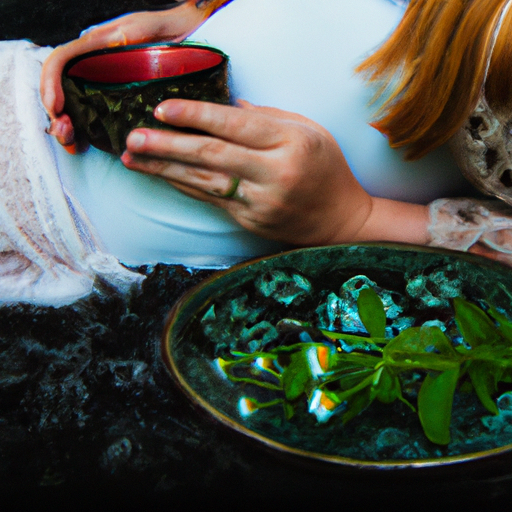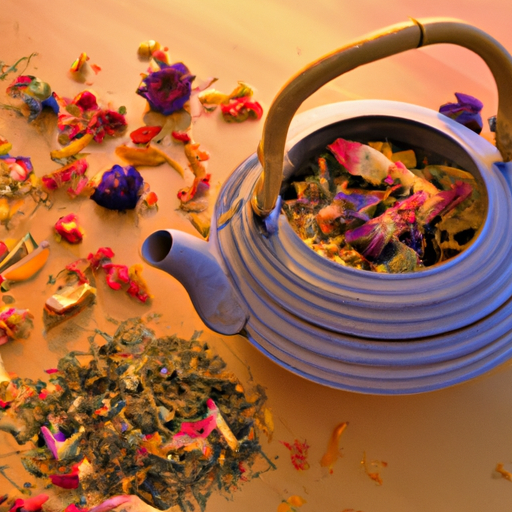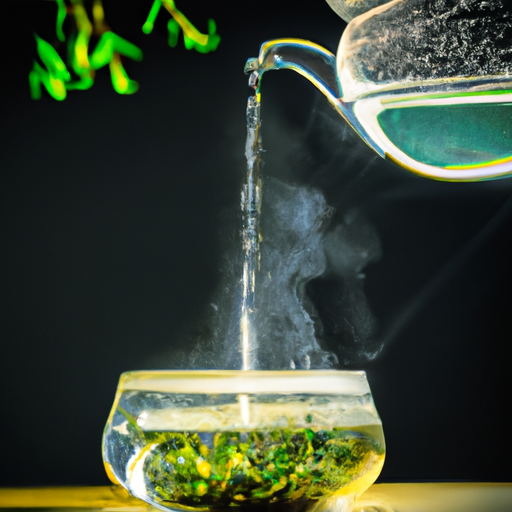Did you know that approximately 75% of pregnant women experience some form of morning sickness during their first trimester?
As someone who has been through this myself, I understand the discomfort and challenges that come with pregnancy. One effective way to alleviate these symptoms is by incorporating herbal teas into your daily routine.
Herbal teas have been used for centuries to support various aspects of health, and during pregnancy, they can provide a natural and gentle way to ease discomfort and promote overall well-being.
In this article, I will guide you through the best herbal teas to consume during pregnancy, based on research and expert recommendations. From soothing chamomile to invigorating ginger, these herbal teas offer a range of benefits that can support your journey to motherhood.
So, grab your favorite mug and let’s explore the wonderful world of herbal teas for pregnant women.
Key Takeaways
- Chamomile, ginger, and peppermint herbal teas are beneficial for pregnant women as they soothe digestive discomfort and reduce inflammation.
- Raspberry Leaf Tea is recommended during pregnancy as it strengthens uterine muscles, eases labor and delivery, and supports postpartum recovery.
- Lemon balm tea promotes relaxation, alleviates digestive discomfort, and supports sleep quality with its mild sedative properties.
- Nettle tea is safe for consumption during pregnancy and provides essential nutrients like iron, calcium, and magnesium while reducing water retention and preventing swelling.
Chamomile Tea
You’ll love how chamomile tea can soothe your pregnancy woes and help you relax!
Chamomile tea is a popular herbal remedy known for its calming properties. It is made from the flowers of the chamomile plant and has been used for centuries for its medicinal benefits.
When it comes to pregnancy, chamomile tea offers numerous advantages. One of the main benefits of chamomile tea during pregnancy is its ability to promote better sleep. Many pregnant women struggle with insomnia and find it difficult to get a good night’s rest. The soothing properties of chamomile tea can help relax the mind and body, making it easier to fall asleep and stay asleep throughout the night. This can be especially beneficial during the later stages of pregnancy when discomfort and restlessness are common.
In addition to improving sleep, chamomile tea also offers other benefits for pregnant women. It has been found to reduce anxiety and stress levels, which can be particularly helpful during the hormonal changes and emotional ups and downs of pregnancy. Chamomile tea is also known for its anti-inflammatory properties, which can help alleviate any aches and pains associated with pregnancy.
While chamomile tea is generally considered safe during pregnancy, it’s always best to consult with your healthcare provider before incorporating it into your routine.
Now, let’s move on to the next herbal tea that can benefit you during pregnancy – peppermint tea.
Peppermint Tea
Sipping on a cup of refreshing peppermint tea can be a delightful way to soothe your senses during pregnancy. Not only does it offer a refreshing taste, but it also provides several benefits for expectant mothers.
Peppermint tea is known to relieve nausea and morning sickness, which are common discomforts during pregnancy. The natural properties of peppermint help to relax the muscles of the gastrointestinal tract, easing digestion and reducing the chances of acid reflux. Additionally, peppermint tea has a cooling effect that can alleviate headaches and migraines, which are often experienced by pregnant women due to hormonal changes.
It is important, however, to exercise caution when consuming peppermint tea while pregnant. Although it is generally considered safe, excessive intake may lead to heartburn or exacerbate existing heartburn symptoms. It is advisable to consult with your healthcare provider before adding peppermint tea to your daily routine.
With that in mind, let’s transition into the subsequent section about ginger tea, another herbal tea that brings numerous benefits for expectant mothers.
Ginger Tea
Ginger tea is an excellent choice for relieving nausea and vomiting during pregnancy. It’s been used for centuries as a natural remedy for morning sickness, and studies have shown it’s effective in reducing these symptoms.
Additionally, ginger tea can soothe digestive discomfort by promoting healthy digestion and minimizing bloating and gas.
Lastly, the anti-inflammatory properties of ginger tea can help reduce inflammation and pain, making it a great option for pregnant women experiencing discomfort or swelling.
Relieves Nausea and Vomiting
Peppermint tea can be a soothing remedy for expectant mothers experiencing morning sickness, with studies showing that it reduces nausea by up to 50%. This herbal tea is a natural way to alleviate the discomfort of morning sickness during pregnancy. Here are some reasons why peppermint tea is a great choice for pregnant women:
- Peppermint tea is known for its calming effect on the stomach, making it an effective remedy for nausea and vomiting.
- It can help relax the muscles of the gastrointestinal tract, reducing the frequency and severity of morning sickness.
- Peppermint tea also has a refreshing and pleasant taste, which can help alleviate the unpleasant taste in the mouth that often accompanies morning sickness.
- This herbal tea is caffeine-free, making it a safe and healthy choice for pregnant women.
As a result, peppermint tea is a popular choice among expectant mothers to alleviate morning sickness and other digestive discomforts during pregnancy.
Moving on to the next section, peppermint tea also soothes digestive discomfort.
Soothes Digestive Discomfort
When you drink it, you’ll feel the soothing relief as your digestive discomfort eases away. During pregnancy, it’s common to experience digestive issues such as bloating, gas, and indigestion.
Thankfully, there are natural remedies available to help alleviate these discomforts. One of the best options is soothing herbal blends, specifically formulated to provide relief for digestive problems. These herbal teas contain ingredients like chamomile, ginger, and peppermint, which have been used for centuries to calm the stomach and improve digestion.
Chamomile has anti-inflammatory properties that can reduce inflammation in the digestive tract, while ginger and peppermint can help relax the muscles in the gastrointestinal system, easing symptoms such as cramping and bloating.
Incorporating these soothing herbal teas into your daily routine can provide much-needed relief from digestive discomfort during pregnancy.
As we transition into the next section about reducing inflammation and pain, it’s important to note that these teas can also have a positive impact on other pregnancy-related concerns.
Reduces Inflammation and Pain
You might not expect it, but incorporating this natural remedy into your daily routine can surprisingly help reduce inflammation and pain during pregnancy. Herbal tea has been used for centuries to alleviate various ailments, and it can be particularly beneficial for managing discomfort during this special time.
The anti-inflammatory properties found in certain herbal teas have been shown to reduce pain caused by inflammation, such as menstrual cramps and arthritis pain. For women experiencing menstrual cramps, herbal teas like chamomile, ginger, and peppermint can help relax the muscles and reduce the intensity of cramps. These teas have soothing effects on the digestive system as well, which can alleviate any discomfort caused by inflammation.
Additionally, herbal teas rich in antioxidants, such as green tea and turmeric tea, can help reduce inflammation throughout the body. This can be especially helpful for pregnant women dealing with arthritis pain or other inflammatory conditions.
Transitioning to the next section about ‘rooibos tea’, let’s explore another herbal tea that offers a plethora of benefits during pregnancy.
Rooibos Tea
If you’re looking for a warm and comforting herbal tea option during pregnancy, one great choice is definitely rooibos tea. Rooibos tea, also known as red tea, is derived from the leaves of the Aspalathus linearis plant native to South Africa. It’s been consumed for centuries due to its various health benefits.
Rooibos tea is a caffeine-free alternative to black or green tea, making it a suitable choice for pregnant women. It contains antioxidants, such as aspalathin and nothofagin, which help to reduce inflammation and protect against oxidative stress. These antioxidants are also believed to have anti-cancer properties.
Moreover, rooibos tea is rich in minerals like calcium, magnesium, and potassium, which are important for the development of the baby’s bones and muscles.
Preparing rooibos tea is simple and similar to brewing traditional tea. Just add a rooibos tea bag or loose tea leaves to a cup of boiling water and let it steep for about 5-7 minutes. You can enjoy it plain or add a touch of honey or lemon for added flavor.
Transitioning into the subsequent section about raspberry leaf tea, another herbal tea option during pregnancy, it’s important to note that raspberry leaf tea is known for its potential benefits in preparing the body for labor and childbirth.
Raspberry Leaf Tea
Raspberry Leaf Tea is a popular choice for pregnant women due to its potential benefits for strengthening uterine muscles, easing labor and delivery, and supporting postpartum recovery.
Drinking this herbal tea is believed to help tone and strengthen the muscles of the uterus, which can potentially lead to smoother contractions during labor. Additionally, it is thought to assist in the recovery process after giving birth, helping the uterus return to its pre-pregnancy state.
While more research is needed to fully understand the effects of Raspberry Leaf Tea, many women find it to be a helpful addition to their pregnancy journey.
Strengthens Uterine Muscles
After indulging in a cup of this herbal tea, you’ll feel like Wonder Woman with your uterine muscles strengthened and ready for anything. Raspberry Leaf Tea is renowned for its ability to strengthen uterine muscles, making it a popular choice among pregnant women.
Alongside regular strengthening exercises, this herbal remedy can provide additional support in preparing your body for labor and delivery. Research suggests that the tannins present in Raspberry Leaf Tea help tone and tighten the muscles of the uterus, potentially leading to shorter and more efficient contractions during labor. This natural remedy has been used for centuries and is considered safe for consumption during pregnancy.
So, sipping on a cup of Raspberry Leaf Tea not only tastes delicious, but it also contributes to the overall well-being of your pregnancy journey.
In the next section, we will explore how this herbal tea eases labor and delivery.
Eases Labor and Delivery
Prepare yourself for a smoother and more manageable labor and delivery with the incredible benefits of Raspberry Leaf Tea. This herbal tea has been used for centuries to ease labor and promote relaxation during childbirth. Here are three ways Raspberry Leaf Tea can benefit you during this crucial time:
-
Reduces the duration of labor: Studies have shown that women who consumed Raspberry Leaf Tea experienced shorter labor duration compared to those who didn’t. This can result in less exhaustion and a more efficient delivery process.
-
Eases contractions: Raspberry Leaf Tea has been found to help relax the uterine muscles, allowing for smoother and less painful contractions. This can make the entire labor experience more bearable and less stressful.
-
Promotes relaxation: The calming properties of Raspberry Leaf Tea can help you stay relaxed and focused during labor. This can lead to a more positive birthing experience and a smoother transition into motherhood.
By incorporating Raspberry Leaf Tea into your pregnancy routine, you can reap these benefits and support your postpartum recovery.
Supports Postpartum Recovery
The road to recovery after childbirth is like a winding river, and incorporating Raspberry Leaf Tea can serve as a gentle current, helping to support and nourish your body as it heals and finds its new rhythm.
Postpartum healing is a crucial time for a new mother, and using natural remedies can aid in this process. Raspberry Leaf Tea has been used for centuries as a tonic for women during the postpartum period. It’s rich in vitamins and minerals that promote healing and strengthen the uterus. This herbal tea can also help reduce postpartum bleeding and alleviate cramping. Additionally, Raspberry Leaf Tea is known to boost milk production, which is beneficial for breastfeeding mothers.
As we transition to discussing lemon balm tea, let’s explore how this herbal remedy can further support postpartum recovery.
Lemon Balm Tea
Indulge in the refreshing taste of lemon balm tea, perfect for soothing your senses during pregnancy. This delightful herbal tea not only offers a zesty flavor but also provides numerous benefits for expectant mothers.
Lemon balm, also known as Melissa officinalis, has been used for centuries due to its medicinal properties. Here are some reasons why lemon balm tea is a great choice for pregnant women:
-
Promotes relaxation: Lemon balm has calming effects on the nervous system, helping to reduce anxiety and promote a sense of tranquility, which can be particularly beneficial during the rollercoaster of emotions that pregnancy can bring.
-
Alleviates digestive discomfort: Pregnancy often comes with digestive issues such as bloating and indigestion. Lemon balm tea can help ease these discomforts by soothing the digestive tract and reducing spasms.
-
Supports sleep quality: As any expecting mother knows, getting a good night’s sleep can be challenging. Lemon balm tea has mild sedative properties that can aid in improving sleep quality, helping you feel more rested.
While lemon balm tea is generally safe for consumption during pregnancy, it’s important to exercise caution and consult with your healthcare provider before adding it to your routine. Some individuals may experience mild side effects such as dizziness or nausea.
Now, let’s move on to explore another beneficial herbal tea for expectant mothers: nettle tea.
Nettle Tea
Now that we’ve discussed the benefits of Lemon Balm Tea during pregnancy, let’s move on to another herbal tea that’s often recommended for expectant mothers – Nettle Tea.
Nettle tea, derived from the leaves of the stinging nettle plant, is known for its numerous health benefits. It’s packed with essential nutrients like iron, calcium, and magnesium, which are important for both the mother and the developing baby. Iron helps in the production of red blood cells, while calcium and magnesium support the growth of strong bones and teeth.
Additionally, nettle tea is a natural diuretic, which can help reduce water retention and prevent swelling, a common issue during pregnancy.
If you’re interested in trying nettle tea, here’s a simple recipe you can follow: steep 1 teaspoon of dried nettle leaves in a cup of boiling water for about 5-10 minutes. You can add honey or lemon for a touch of sweetness or flavor. It’s important to note that it’s always best to consult with your healthcare provider before adding any herbal tea to your pregnancy diet, as some herbs may have contraindications or interact with medications.
Nettle tea can be a beneficial addition to a pregnant woman’s diet due to its rich nutrient content and potential diuretic properties.
Frequently Asked Questions
Can I drink chamomile tea during pregnancy?
Chamomile tea is generally considered safe during pregnancy. However, it’s always best to consult with your healthcare provider. If you’re looking for herbal tea alternatives, consider peppermint, ginger, or raspberry leaf tea.
Is peppermint tea safe to consume while pregnant?
Yes, peppermint tea is generally considered safe to consume during pregnancy. It can help with morning sickness and promote digestive health. However, it’s important to drink it in moderation and consult with your healthcare provider.
What are the benefits of ginger tea during pregnancy?
Ginger tea offers several health benefits during pregnancy. It can help alleviate nausea, reduce inflammation, and improve digestion. To maximize its benefits, steep fresh ginger root in hot water for 10-15 minutes and enjoy it warm.
Can I drink rooibos tea throughout my pregnancy?
Green tea is generally considered safe during pregnancy when consumed in moderation. However, black tea contains caffeine which may have potential risks, such as increased fetal heart rate. It’s best to consult with your healthcare provider for personalized advice.
Is it safe to consume raspberry leaf tea during pregnancy?
It is not recommended to consume raspberry leaf tea during pregnancy due to potential risks. While it may be effective in inducing labor, more research is needed to determine its safety. Consult with a healthcare professional before using.
Conclusion
In conclusion, when it comes to choosing the best herbal tea during pregnancy, there are several options that offer both delicious flavors and potential health benefits.
Chamomile tea, with its calming properties, can be a soothing choice for expectant mothers.
Peppermint tea may help with digestion and alleviate symptoms of morning sickness.
Ginger tea is known for its anti-inflammatory properties and can be helpful for nausea.
Rooibos tea is a caffeine-free option that is rich in antioxidants.
Raspberry leaf tea is often recommended for its potential benefits on uterine health.
Lemon balm tea can provide relaxation and promote better sleep.
Nettle tea is a nutritional powerhouse, containing vitamins and minerals that can support overall well-being during pregnancy.
So, just like a warm hug on a chilly day, these herbal teas can offer comfort and nourishment to pregnant women.










